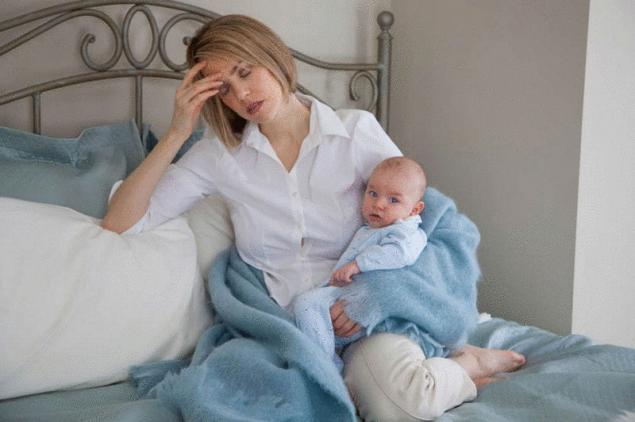651
Why children do not sleep at night? In a nutshell: they don'T HAVE
All parents of young children are experiencing, why they do not sleep at night. Continuous, "normal" night's sleep has become the Holy Grail in the matter of raising children.
Yes, some people are so lucky as Gwyneth Paltrow and their children sleep all night as adults, but for most parents, such a situation is a distant dream.
Perhaps that is why the theme of children's insomnia — the most popular on Internet forums. All book and magazine industry has exploited the people, giving them the idea: you're a good parent, if your children are fast asleep at night.

It is time to dispel these rumors. Here are some facts about how really should be sleeping children.
1. Why children Wake up at night? Because that's what nature intended.
Peter Fleming, a Professor and pediatrician from the University of Bristol, says that the idea that the children must sleep all night, appeared only in the XX century. In fact, almost all the children Wake up at night, and that's fine.
"Our babies are not created by nature to sleep for too long. When they sleep a lot, it's not very good. There is absolutely no evidence that a well-sleeping baby is definitely a healthy baby," he says.
He admits: "Maybe it's not what I hear most parents."
2. In fact, no one sleeps through the night, even adults.Garcia Narvaez, Professor of psychology from the University of Notre Dame, said that continuous eight hours of sleep in adults — a myth. People may believe that they sleep soundly all night, but it's not.
"People rarely sleep all night without waking up. But our brain is designed in such a way that we forget about it. Look at the history of mankind: why do people prior to the twentieth century, before the invention of electricity, so often worked at night? Men are created by nature to sleep a few times a day, short periods. If we continued to live in the impenetrable forests, so for us it would be safer. Hunters and gatherers before the advent of civilization slept several times a day for two hours," she says.
3. Young men must be in much closer contact with parents than animals. They are in greatest need to feel the mother near."People usually lag behind in development after birth for 9 to 18 months from other mammals, says Narvaez. — Other animals are already starting to walk and eat on their own, and our children continue to look like a nearly immobile fetus. You want your child to be calm since birth, but his brain is underdeveloped in comparison with your only 25%. He can't control his emotions and needs constant care and attention."
4. Children who often Wake up at night usually have a higher level of intelligence and are characterized by better mental health.Fleming says that numerous studies confirm the thesis that people who were very restless in infancy, as they grow older have a higher IQ.Narvaez adds: the more the attention of the sleepy parents, the child gets in infancy, the more psychologically Mature it will grow. He's more likely to be an empath, to be a kind person, able to empathize with others, but will remain disciplined and responsible.
One study even showed that children who are "worse" than the other slept, had high cognitive abilities and less likely to suffer from depression in adulthood than "demure".
5. Children have a much shorter sleep cycle than adults.
Sleep adults is usually a 90-minute cycle. First you sleep, then deep sleep." But half an hour later — again "fast".
In children it is not so, says Fleming. In newborns this cycle — 60-minute. So when they end without squirming in bed and Wake up — this is perfectly normal.
6. Parents always respond to crying children. Even if they cry silently.One study, conducted in 2011, showed that early parental response to crying is very important for his mental and even physical health. Parents who prematurely start to "teach" the child to ensure that he did not cry, should know: the hysterics for him — the stress of incredible size.
Narvaez explains: "You can take that teach a child not to cry, hurl, not paying attention to it. But while he screams, his little body quickly builds up a level of a stress hormone called cortisol. To calm down, he needs proper stress response: mom close and feeling her body."
If the parent does not appear in time in the field of view of the child, the sympathetic nervous system gives a signal to the brain: "Fight or flight".
It's such a deep, if not, the initial reaction to the feeling of insecurity. The brain interprets it this way: "we Need to start screaming louder. If nobody will hear me. you will die". So the next time you think about what the child feels when shouts of "no reason", you know: it feels as if you knew that soon will die.Some children cry so much that "turn blue". This is the body's response to the orders of the parasympathetic system: the need to conserve energy, hence lowering the body temperature. This is an extreme reaction when the body is mobilized in order not to die.
7. Children can sleep during the day and Wake up at night, just to make sure that you're around."As a rule, kids love to sleep during the day, and from six in the evening until midnight when they are under the scrutiny of parents to stay awake with great pleasure," says Fleming.
"We are talking about natural programming. When children are under the attention of two parents, you get a biological advantage: when two breadwinners, the chance of survival is much higher. The child chooses a schedule of waking consciously and correctly. And the fact that such a regime does not fit into your schedule, he doesn't care".
8. Children should not sleep separately from their parents, especially in another room.
Fleming offers to return to the evolutionary history of man. Thousands of years ago children were always in close contact with their parents, slept between their bodies in the cave, and the day mom wore them myself.
"I spent a lot of time in Africa and other places where it is accepted to carry babies on itself. They are near the mother all the time. They sleep when they should sleep, and awake when I should be awake. Food from mother's breast they, too, are always at hand. And it is the correct and safe way to raise children. You don't always have to sit with the baby at home."
Fleming adds: there is evidence that sudden infant death syndrome often overtakes children who slept in the separate rooms.
9. Worldwide, many children in the first stage of their life sleeping with their parents. And it is absolutely logical: they need constant contact with the parents and then get upset when you don't get it.Fleming argues that the habit of sleeping in the same bed with children is found in the world more often than I think residents of large European and American cities.
"The idea that a baby should have its own separate bed is pretty normal, it's actually nonsense," he says. And he adds: "500 thousand years ago 90% of human children were sleeping, clinging to parents".
Of course, the constant tactile contact parents who need to go to work, their children can not provide. Of course, with no compromise here in any way. But he insists: while you are at home, give your children as much attention as can be given.
This is the best way to raise smart, independent and highly organized children.This can be very frustrating for you true, but the process, when the child is testing you for strength night after night, day after day, for natural children.
Infants are determined that all their needs are immediately satisfied with their primary caregiver (mom). It should be close throughout the night. And this is the least we can do for them.
Fleming concludes: "we must remember that our society is changing and evolving much faster than biology. The biological model of life, which was used by our ancestors half a million years ago, worked in the education of children is far better than its modern counterpart.
Remember that when you are ignoring your child, then don't bring him in this moment nothing but senseless pain and suffering." published
P. S. And remember, just changing your mind — together we change the world! ©
Source: lifter.com.ua/Vot-pochemu-vash-rebenok-ne-spit-vsyu-noch#40564
Yes, some people are so lucky as Gwyneth Paltrow and their children sleep all night as adults, but for most parents, such a situation is a distant dream.
Perhaps that is why the theme of children's insomnia — the most popular on Internet forums. All book and magazine industry has exploited the people, giving them the idea: you're a good parent, if your children are fast asleep at night.

It is time to dispel these rumors. Here are some facts about how really should be sleeping children.
1. Why children Wake up at night? Because that's what nature intended.
Peter Fleming, a Professor and pediatrician from the University of Bristol, says that the idea that the children must sleep all night, appeared only in the XX century. In fact, almost all the children Wake up at night, and that's fine.
"Our babies are not created by nature to sleep for too long. When they sleep a lot, it's not very good. There is absolutely no evidence that a well-sleeping baby is definitely a healthy baby," he says.
He admits: "Maybe it's not what I hear most parents."
2. In fact, no one sleeps through the night, even adults.Garcia Narvaez, Professor of psychology from the University of Notre Dame, said that continuous eight hours of sleep in adults — a myth. People may believe that they sleep soundly all night, but it's not.
"People rarely sleep all night without waking up. But our brain is designed in such a way that we forget about it. Look at the history of mankind: why do people prior to the twentieth century, before the invention of electricity, so often worked at night? Men are created by nature to sleep a few times a day, short periods. If we continued to live in the impenetrable forests, so for us it would be safer. Hunters and gatherers before the advent of civilization slept several times a day for two hours," she says.
3. Young men must be in much closer contact with parents than animals. They are in greatest need to feel the mother near."People usually lag behind in development after birth for 9 to 18 months from other mammals, says Narvaez. — Other animals are already starting to walk and eat on their own, and our children continue to look like a nearly immobile fetus. You want your child to be calm since birth, but his brain is underdeveloped in comparison with your only 25%. He can't control his emotions and needs constant care and attention."
4. Children who often Wake up at night usually have a higher level of intelligence and are characterized by better mental health.Fleming says that numerous studies confirm the thesis that people who were very restless in infancy, as they grow older have a higher IQ.Narvaez adds: the more the attention of the sleepy parents, the child gets in infancy, the more psychologically Mature it will grow. He's more likely to be an empath, to be a kind person, able to empathize with others, but will remain disciplined and responsible.
One study even showed that children who are "worse" than the other slept, had high cognitive abilities and less likely to suffer from depression in adulthood than "demure".
5. Children have a much shorter sleep cycle than adults.
Sleep adults is usually a 90-minute cycle. First you sleep, then deep sleep." But half an hour later — again "fast".
In children it is not so, says Fleming. In newborns this cycle — 60-minute. So when they end without squirming in bed and Wake up — this is perfectly normal.
6. Parents always respond to crying children. Even if they cry silently.One study, conducted in 2011, showed that early parental response to crying is very important for his mental and even physical health. Parents who prematurely start to "teach" the child to ensure that he did not cry, should know: the hysterics for him — the stress of incredible size.
Narvaez explains: "You can take that teach a child not to cry, hurl, not paying attention to it. But while he screams, his little body quickly builds up a level of a stress hormone called cortisol. To calm down, he needs proper stress response: mom close and feeling her body."
If the parent does not appear in time in the field of view of the child, the sympathetic nervous system gives a signal to the brain: "Fight or flight".
It's such a deep, if not, the initial reaction to the feeling of insecurity. The brain interprets it this way: "we Need to start screaming louder. If nobody will hear me. you will die". So the next time you think about what the child feels when shouts of "no reason", you know: it feels as if you knew that soon will die.Some children cry so much that "turn blue". This is the body's response to the orders of the parasympathetic system: the need to conserve energy, hence lowering the body temperature. This is an extreme reaction when the body is mobilized in order not to die.
7. Children can sleep during the day and Wake up at night, just to make sure that you're around."As a rule, kids love to sleep during the day, and from six in the evening until midnight when they are under the scrutiny of parents to stay awake with great pleasure," says Fleming.
"We are talking about natural programming. When children are under the attention of two parents, you get a biological advantage: when two breadwinners, the chance of survival is much higher. The child chooses a schedule of waking consciously and correctly. And the fact that such a regime does not fit into your schedule, he doesn't care".
8. Children should not sleep separately from their parents, especially in another room.
Fleming offers to return to the evolutionary history of man. Thousands of years ago children were always in close contact with their parents, slept between their bodies in the cave, and the day mom wore them myself.
"I spent a lot of time in Africa and other places where it is accepted to carry babies on itself. They are near the mother all the time. They sleep when they should sleep, and awake when I should be awake. Food from mother's breast they, too, are always at hand. And it is the correct and safe way to raise children. You don't always have to sit with the baby at home."
Fleming adds: there is evidence that sudden infant death syndrome often overtakes children who slept in the separate rooms.
9. Worldwide, many children in the first stage of their life sleeping with their parents. And it is absolutely logical: they need constant contact with the parents and then get upset when you don't get it.Fleming argues that the habit of sleeping in the same bed with children is found in the world more often than I think residents of large European and American cities.
"The idea that a baby should have its own separate bed is pretty normal, it's actually nonsense," he says. And he adds: "500 thousand years ago 90% of human children were sleeping, clinging to parents".
Of course, the constant tactile contact parents who need to go to work, their children can not provide. Of course, with no compromise here in any way. But he insists: while you are at home, give your children as much attention as can be given.
This is the best way to raise smart, independent and highly organized children.This can be very frustrating for you true, but the process, when the child is testing you for strength night after night, day after day, for natural children.
Infants are determined that all their needs are immediately satisfied with their primary caregiver (mom). It should be close throughout the night. And this is the least we can do for them.
Fleming concludes: "we must remember that our society is changing and evolving much faster than biology. The biological model of life, which was used by our ancestors half a million years ago, worked in the education of children is far better than its modern counterpart.
Remember that when you are ignoring your child, then don't bring him in this moment nothing but senseless pain and suffering." published
P. S. And remember, just changing your mind — together we change the world! ©
Source: lifter.com.ua/Vot-pochemu-vash-rebenok-ne-spit-vsyu-noch#40564























